Microorganisms II -> acid-base reaction
Acid-Base Reaction
An acid-base reaction is a chemical reaction that occurs between an acid and a base. Acids are substances that can donate a proton (H+) and bases are substances that can accept a proton. When an acid and a base react, they form a salt and water. This type of reaction is also known as a neutralization reaction.
Acid Characteristics:
Base Characteristics:
- Bitter taste
- Turns red litmus paper blue
- Slippery to the touch
- Proton acceptors
General Equation for Acid-Base Reaction:
Examples of Acid-Base Reactions:
1. Hydrochloric acid (HCl) + Sodium hydroxide (NaOH) → Sodium chloride (NaCl) + Water (H2O)
2. Sulfuric acid (H2SO4) + Potassium hydroxide (KOH) → Potassium sulfate (K2SO4) + Water (H2O)
Study Guide
Key Concepts:
- Identify the characteristics of acids and bases.
- Understand the general equation for acid-base reactions.
- Be able to provide examples of acid-base reactions.
Practice Questions:
- What are the characteristics of acids and bases?
- Provide an example of an acid-base reaction and write the balanced chemical equation for it.
- Explain the process of neutralization in an acid-base reaction.
Studying acid-base reactions is important in understanding the behavior of various substances and their interactions in the environment and in biological systems.
.◂Biology Worksheets and Study Guides High School. Microorganisms II
Worksheet/Answer key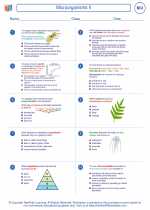 Microorganisms II
Microorganisms II  Worksheet/Answer key
Worksheet/Answer key Microorganisms II
Microorganisms II  Worksheet/Answer key
Worksheet/Answer key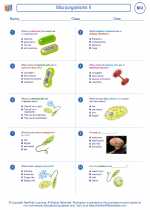 Microorganisms II
Microorganisms II  Vocabulary/Answer key
Vocabulary/Answer key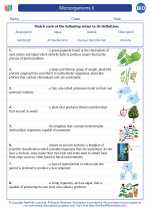 Microorganisms II
Microorganisms II  Vocabulary/Answer key
Vocabulary/Answer key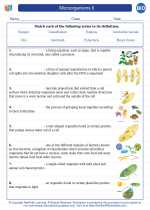 Microorganisms II
Microorganisms II  Vocabulary/Answer key
Vocabulary/Answer key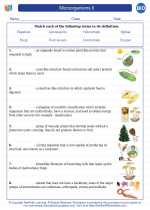 Microorganisms II
Microorganisms II  Vocabulary/Answer key
Vocabulary/Answer key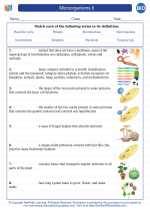 Microorganisms II
Microorganisms II  Vocabulary/Answer key
Vocabulary/Answer key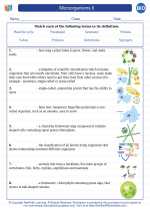 Microorganisms II
Microorganisms II 

 Worksheet/Answer key
Worksheet/Answer key
 Worksheet/Answer key
Worksheet/Answer key
 Vocabulary/Answer key
Vocabulary/Answer key
 Vocabulary/Answer key
Vocabulary/Answer key
 Vocabulary/Answer key
Vocabulary/Answer key
 Vocabulary/Answer key
Vocabulary/Answer key
 Vocabulary/Answer key
Vocabulary/Answer key

The resources above cover the following skills:
Life Science
Organization and Development of Living Organisms - A. Cells have characteristic structures and functions that make them distinctive. B. Processes in a cell can be classified broadly as growth, maintenance, reproduction, and homeostasis. C. Life can be organized in a functional and structural hierarchy ranging from cells to the biosphere. D. Most multicellular organisms are composed of organ systems whose structures reflect their particular function.
Relate the major structure of fungi to their functions.
Diversity and Evolution of Living Organisms - A. The scientific theory of evolution is the fundamental concept underlying all of biology. B. The scientific theory of evolution is supported by multiple forms of scientific evidence. C. Organisms are classified based on their evolutionary history. D. Natural selection is a primary mechanism leading to evolutionary change.
Discuss distinguishing characteristics of the domains and kingdoms of living organisms.